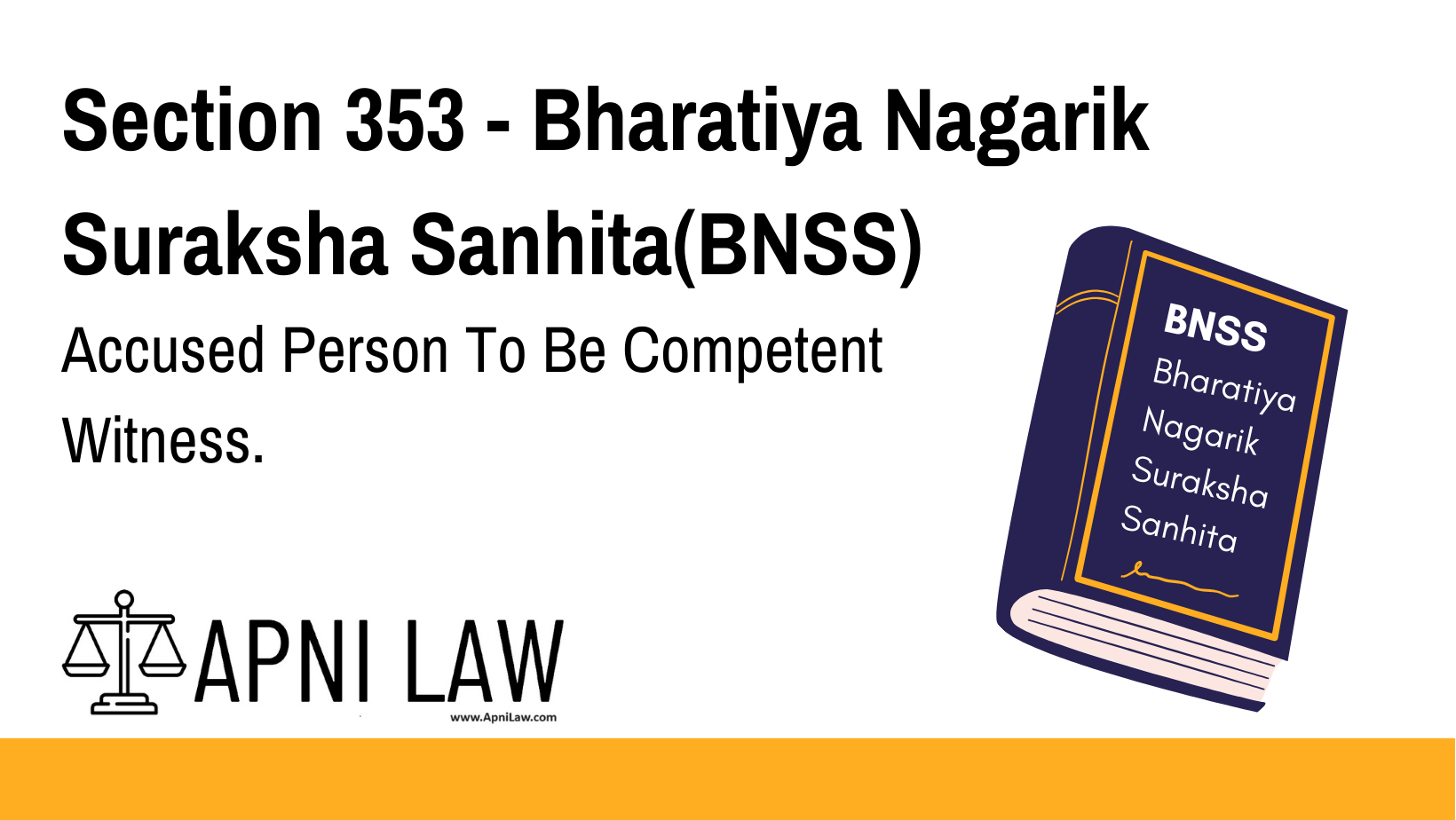Section 353 of the Bharatiya Nagarik Suraksha Sanhita (BNSS)
Code: Section 353 BNSS
353. Accused person to be competent witness.—(1) Any person accused of an offence before a
Criminal Court shall be a competent witness for the defence and may give evidence on oath in disproof of the charges made against him or any person charged together with him at the same trial: Provided that—
(a) he shall not be called as a witness except on his own request in writing;
(b) his failure to give evidence shall not be made the subject of any comment by any of the parties or the Court or give rise to any presumption against himself or any person charged together with him at the same trial.
(2) Any person against whom proceedings are instituted in any Criminal Court under section 101, or section 126, or section 127, or section 128, or section 129, or under Chapter X or under Part B, Part C or Part D of Chapter XI, may offer himself as a witness in such proceedings:
Provided that in proceedings under section 127, section 128, or section 129, the failure of such person to give evidence shall not be made the subject of any comment by any of the parties or the Court or give rise to any presumption against him or any other person proceeded against together with him at the same inquiry.
Criminal Court shall be a competent witness for the defence and may give evidence on oath in disproof of the charges made against him or any person charged together with him at the same trial: Provided that—
(a) he shall not be called as a witness except on his own request in writing;
(b) his failure to give evidence shall not be made the subject of any comment by any of the parties or the Court or give rise to any presumption against himself or any person charged together with him at the same trial.
(2) Any person against whom proceedings are instituted in any Criminal Court under section 101, or section 126, or section 127, or section 128, or section 129, or under Chapter X or under Part B, Part C or Part D of Chapter XI, may offer himself as a witness in such proceedings:
Provided that in proceedings under section 127, section 128, or section 129, the failure of such person to give evidence shall not be made the subject of any comment by any of the parties or the Court or give rise to any presumption against him or any other person proceeded against together with him at the same inquiry.
Explanation & Purpose of Section 353 BNSS
1. Right to Testify but Not Forced to Do So
- The accused has the right to defend himself by testifying, but the prosecution or court cannot compel him to testify.
- This aligns with the right against self-incrimination under Article 20(3) of the Indian Constitution.
2. Protection from Negative Inference
- If the accused chooses not to testify, it cannot be used against him.
- This prevents unfair pressure on the accused to take the stand.
3. Special Provisions for Security & Public Order Cases
- Accused persons in public order-related proceedings can testify if they wish.
- In certain cases like maintenance and security proceedings (Sections 127-129 BNSS), refusal to testify cannot be used to infer guilt or wrongdoing.
Illustrations & Examples
Example 1: Accused Opting to Testify
Rahul is charged with theft but claims he was at work during the crime. He chooses to testify in his defence, presenting witnesses and CCTV footage to prove his innocence.
Example 2: Accused Choosing Not to Testify
Meera is accused of fraud. Her lawyer advises her not to testify, fearing cross-examination might weaken her defence. The court cannot hold her silence against her.
Example 3: No Negative Inference in Security Proceedings
Arun is facing proceedings under Section 127 BNSS for being a security risk. He chooses not to testify. The court cannot assume he is guilty just because he stayed silent.
Common Questions on Section 353 BNSS
1. Can the prosecution force the accused to testify?
No. The accused can testify only if he voluntarily requests to do so in writing.
2. If the accused does not testify, will the court assume he is guilty?
No. No negative inference can be drawn from the accused’s silence.
3. Can an accused person testify on behalf of a co-accused?
Yes, an accused can give evidence not only for himself but also to disprove charges against a co-accused.
Conclusion
Section 353 BNSS safeguards an accused person’s right to testify without coercion and ensures that silence cannot be used as evidence of guilt. This provision protects fairness in trials and upholds the principle of voluntary testimony.











